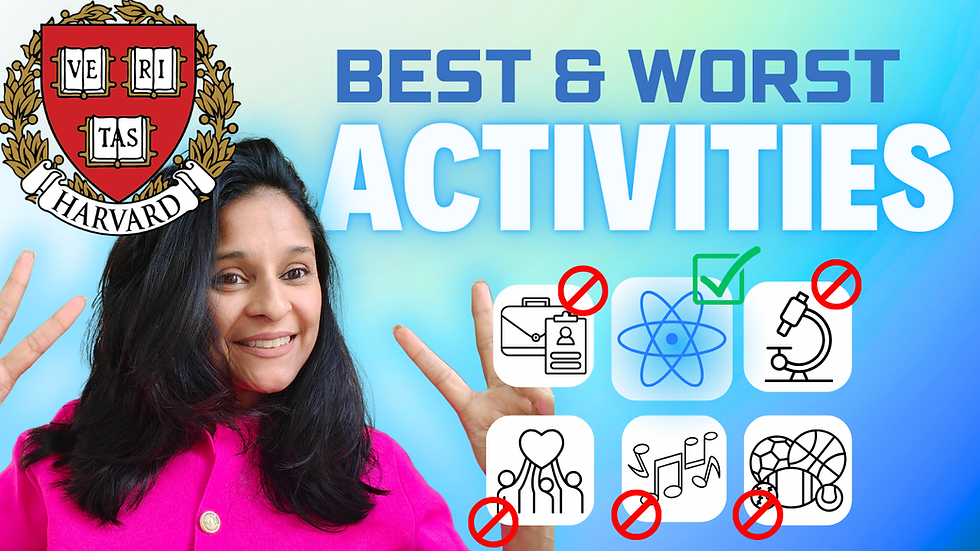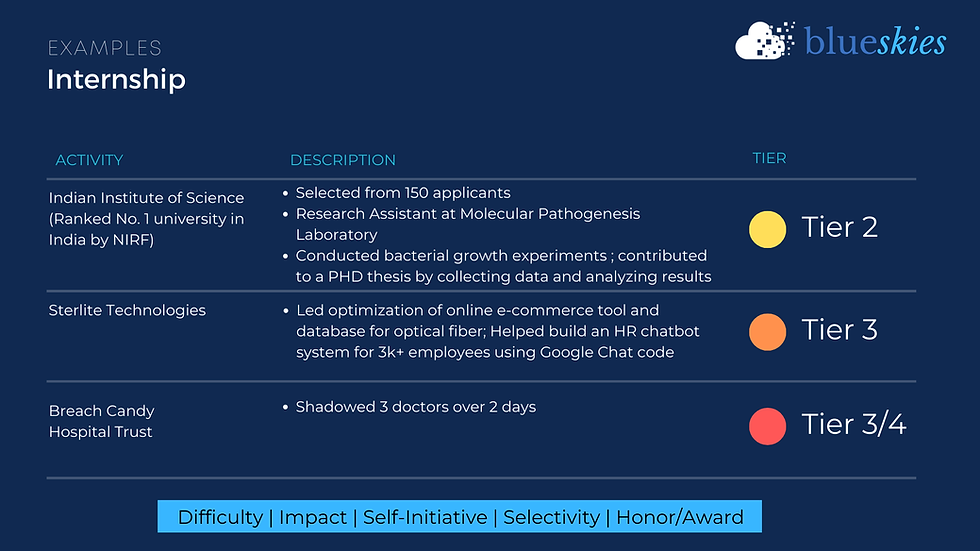20+ Extracurriculars Evaluated by a Wharton Student
- Tina Chulet
- Mar 13, 2025
- 5 min read
Updated: Feb 5

Why Do Extracurriculars Matter More Than You Think for College Admissions?
Imagine two students with identical GPAs and test scores applying to the same top-tier university. One has a laundry list of club memberships, while the other spearheaded a nationwide literacy campaign that impacted thousands. Who do you think stands out? The reality is, once you clear the academic filter, your extracurricular activities become the deciding factor. I am going to share over 20 real activities with you along with the “value of that activity” by giving it a ranking of 1(best) to 4(worst). If you can learn to understand what activities are valuable for top colleges, you will be able to improve upon your own extracurriculars. Stick around if you want to see what is Ivy League worthy & what is NOT!
How to Evaluate Your Extracurricular Activities for College Admissions
Your extracurricular activities play a crucial role in your college application. While academics serve as the initial filter, it is your extracurriculars that truly shape your personal story. Since your college essays will focus on your experiences rather than your grades, the value of your activities becomes paramount. Here’s a detailed framework to evaluate your extracurriculars and maximize their impact.
The Five Key Elements of a Worthwhile Extracurricular Activity
Difficulty
The more challenging the activity, the higher its value. For example, participating in a local gymnastics club is commendable, but being a nationally ranked gymnast holds significantly more weight.
Impact
The depth of the change you create is important. A one-day environmental drive has minimal impact, whereas a three-year campaign resulting in a lake cleanup demonstrates sustained commitment and tangible outcomes.
Self-Initiative
Activities that require you to take charge carry more weight than those structured by institutions. Joining a club is easy; leading one is harder. However, creating a nonprofit or lobbying for policy change at a governmental level showcases exceptional initiative.
Selectivity
The more exclusive an opportunity, the more valuable it is. Being ranked first in a class of 180 or gaining admission to a program with a 6% acceptance rate signifies high selectivity and accomplishment.
Honors & Awards
Winning an award proves achievement beyond participation. Awards are categorized into four tiers:
Tier 1: International recognition (e.g., winning a global science fair)
Tier 2: National awards (e.g., first place in a country-wide competition)
Tier 3: Regional/state-level awards
Tier 4: Local honors (e.g., school-based awards)
Understanding the Tiers of Extracurricular Activities
Extracurricular activities can be classified into four tiers based on difficulty and recognition:
Tier 1: The most prestigious and rare (e.g., a Google Science Fair winner, a nationally ranked athlete, an attendee at a highly selective academic program).
Tier 2: High level but more common than Tier 1 (e.g., student body president, statewide competition winner, impactful self-directed project).
Tier 3: Valuable but widely available (e.g., editor of a school newspaper, treasurer of a club, school-level leadership roles).
Tier 4: The least selective and impactful (e.g., general club membership, hobbies, paid summer programs without a selective application process).

Common Extracurricular Categories & Examples
Community Service Extracurriculars for College
Tier 2: Spearheading a two-year lake rejuvenation project that results in policy change (Without international recognition or awards, this is unlikely to fall into Tier 1 but remember, it is an subjective ranking)
Tier 3: Teaching 200+ hours of English & Math to 400 orphaned children. (While this is extremely commendable, there is no selectivity, honors/awards, and difficulty is minimal)
Tier 4: Distributing climate change brochures with no measurable impact.

The "value" of 3 real extracurricular activities for community service as per top colleges
High School Internships for College
Tier 2: Research assistant at a top institution with a highly selective application process. Student is selected from 150 applicants. (No honors/awards)
Tier 3: Led optimization of HR chatbot at Sterilite Technologies (no selectivity, honors/awards, and difficulty is minimal, no initiative. However internships are liked by colleges given they support your academic interest. )
Tier 4: Shadowing professionals for a short period with no tangible contributions. (None of 5 elements appear)

The "value" of 3 real extracurricular activities for internships as per top colleges
High School Summer Programs for College
Tier 1: Admission to a competitive program (e.g., Stanford SUMaC with a 6% acceptance rate).
Tier 3: Paid, Online Summer Program at Wharton Future of Business (while there is an application process and it supports your academic interest, it is not very selective and if you have enough means, you can attend.)
Tier 4: Paid, non-selective programs that anyone can attend like Youth Creativity, Innovation, Sustainable Leadership.

The "value" of 3 real extracurricular activities for Summer Programs as per top colleges
Research Extracurriculars for College
Tier 1: Wrote a paper about the role of humanin for Alzheimer's under a PHD and won an award at MIT (1 of 6 applicants selected)
Tier 2/3: Research under a professor without an award. “The effect of metros on improving epidemic parameters in COVID-19 cases in India.”
Tier 3: Independent research with no peer review on the “Compliance of Minimum Wage in India”. (Without a professor to verify the quality of the paper or an award/honor, it is hard to know how difficult it was to write your paper. 1 point for self-initiative and commitment to your field)

The "value" of 3 real extracurricular activities for Research Papers as per top colleges
High School Sports That Matter for College
Tier 1: Top 20 national ranking in track and field for India Female Sprinter
Tier 1: Swam the English Channel in a team and recognized as the youngest participant from India.
Tier 3: Captain of school’s soccer team. (Leadership role provides 1 point but given the number of captains of a sport which exist amongst high-school student, it is a common activity)
Tier 4: Participation in school sports basketball team with no significant accolades.

The "value" of 3 real extracurricular activities for Sports as evaluated by a Wharton Graduate
High School Passion Projects for College
Tier 1: Started a passion project that educates 10,000+ students and gains media attention.
Tier 1: Bakery for nonprofit that sold 20,000 cookies over 4 years; built a network of high school sales representatives to sell. Funded education of 56 girls.
Tier 1: Created a foundation to upskill illiterate girls and make them employable. Employed 300 girls at local manufacturing units.

The "value" of 3 real extracurricular activities for Passion Projects as evaluated by a Wharton Graduate
Takeaways for Extracurriculars:
I want to leave you with two critical keys to top admissions for students.
Key 1: The Well-Rounded vs. The Super-Passionate Applicant
Top-tier universities prioritize expertise over general involvement. Applicants tend to fall into two categories: Well-Rounded & Super Passionate. A well-rounded applicant is engaged in diverse activities across different fields (e.g., sports, leadership, research, and community service). A super-passionate: Focused on a single domain with deep involvement (e.g., a student involved in multiple debate and public speaking activities, showcasing expertise in communication). Selective schools often prefer super-passionate applicants because they demonstrate focused drive and long-term commitment.
Key 2: The Importance of Consecutive Growth
Building on previous efforts is crucial. Rather than repeating the same activities with no progression, aim for continuous improvement. For instance:
9th Grade: Start a blog.
10th Grade: Expand readership and invite guest writers.
11th Grade: Get published in larger outlets.
12th Grade: Win writing awards or secure a paid writing position.
Admissions officers value students who push themselves beyond their comfort zones and evolve their initiatives over time.
Your Activities Tell Your Story—Make It Count!
Colleges don’t just admit students—they admit future leaders, changemakers, and innovators. Your extracurriculars should reflect who you are and what you stand for. Instead of spreading yourself thin, build a profile that tells a compelling story. Remember, it’s not about doing everything—it’s about doing the right things with purpose and passion.
Still have questions? Book a call here.
If you found this guide helpful, sign up for our newsletter for more college admissions tips and insights!



Comments